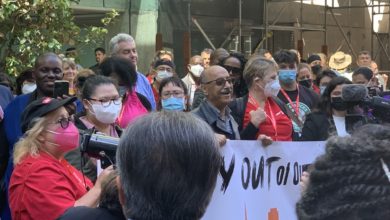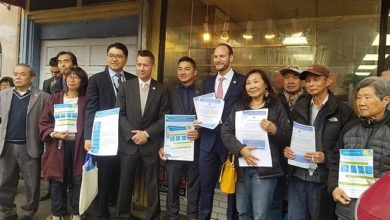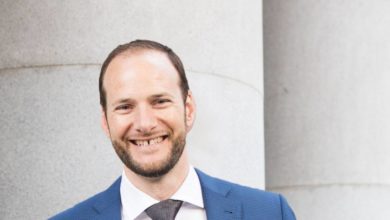The fourth annual convention of Al-Awda, the Palestinian Right of Return Coalition, was held at San Francisco State University from July 14 to 16. The convention opened as Israeli tanks, ships and airplanes were unleashing the latest reign of terror against the Lebanese and Palestinian people. The convention affirmed the Palestinian right of return and condemned the latest assault by the Zionist state.
A concluding statement from the convention stated, “At this moment, while the Israeli war machine unleashes itself
 |
As part of the spirit of resistance and self-determination expressed at the convention, the statement endorsed the Aug. 12 National Emergency March to Defend the People of Lebanon and Palestine, initiated by the ANSWER Coalition (Act Now to Stop War and End Racism), the National Council of Arab Americans and the Muslim American Society Freedom Foundation.
“We challenge the people and institutions of conscience throughout the United States to condemn, in principle and in action, the aggression being waged against the Palestinian and Lebanese people, and to stand in solidarity with the victims of this aggression. In this regard, we call for support and participation in the National Emergency March being held in Washington, D.C., on 12 August 2006,” the statement reads. Click here to read the entire statement.
It was a struggle just to hold the convention as local and national Zionist forces tried to get the university to cancel the venue. A determined struggle on the part of the organizers ensured that the Zionists did not prevail.
The opening plenary and dinner included speakers, film, and cultural presentations by musicians and Dabkeh dancers. The keynote speakers were Dr. Salman Abu Sitta and Professor Rabab Abdulhadi.
Dr. Abu Sitta, a renowned author with dozens of publications on the Palestinian right of return, debunked the Zionist argument that it is not practical for Palestinians to return to their homes. Based on decades of research, he explained that 80 percent of Israeli Jews live on 15 percent of the territory that is called Israel. He explained that 90 percent of the 530 villages from which Palestinians were expelled remain uninhabited to this day. Dr. Abu Sitta went on to explain that a significant number of Palestinians in the diaspora can either see their ancestral homes from where they live or live in refugee camps that are a short distance away.
Professor Rabab Abdulhadi spoke of the diversity of the Palestinian people. She explained that there are different experiences and perspectives within the Palestinian nation based on where one lives—inside the green line, in the occupied territories, in refugee camps, or in other countries. She affirmed that what unites all these different perspectives is a central desire for the whole nation to return to Palestine.
In addition to the keynote speakers, the evening program included welcoming remarks from Jess Ghannam, representing the San Francisco host committee. An address by Eyad Kishawi, also of the host committee, recounted the struggle at SFSU to hold the event. Lamis Deek of Al-Awda—New York provided a national welcoming talk in which she chronicled the history of Al-Awda as representing the aspirations of the Palestinian nation to return to Palestine.
On Saturday, participants heard presentations at a plenary session and then attended various workshops and panel discussions. The day began with an orientation given by LA 8 defendant Michel Shehadeh and Professor Hatem Bizian of the University of California, Berkeley, about the history of the Palestine solidarity movement in the United States and the need for renewed struggle in support of Palestine. The workshops conveyed useful information and plans of action for the coming year on a wide variety of issues.
Members of the Party for Socialism and Liberation attended and participated in various aspects of the convention, from security to presentations at two workshops.






